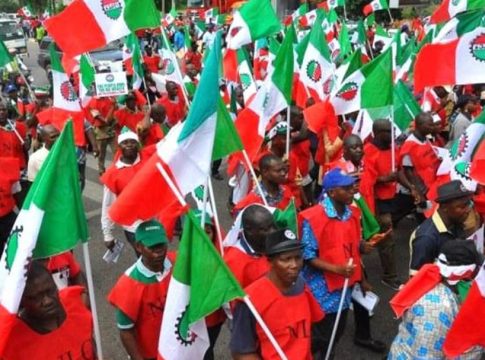The Nigeria Labour Congress (NLC) has issued a deadline for all Nigerian state governments to implement the 2024 National Minimum Wage Act by December 1, stressing that the measure is essential to alleviate the worsening economic struggles faced by millions of Nigerian workers.
The NLC warns that failure to comply will lead to nationwide strikes, with state workers taking industrial action as a response to delays the union considers unlawful and immoral. This directive follows an NLC National Executive Council (NEC) meeting in Port Harcourt, where union officials voiced growing frustration over unimplemented wage promises amidst an economic climate that is increasingly pushing families into poverty.
NLC President Joe Ajaero, in a communiqué released after the meeting, expressed strong dissatisfaction with what he termed a “betrayal” by several state governments that have yet to implement the new wage structure mandated by the 2024 act. “This delay in implementation undermines the legal rights of workers and aggravates their economic suffering. It is a betrayal by certain governors and officials who are disregarding both legality and morality,” Ajaero stated.
He highlighted that, with inflation climbing above 24% in recent months, Nigerian workers are facing the sharpest increase in living costs in decades. Rising food prices—up by as much as 30% over the past year—have made basic sustenance challenging for low-income families, forcing many to choose between essential needs such as food, shelter, and healthcare.
READ MORE: World Leaders Swiftly Extend Congratulations to Trump Following Election Victory
The NLC noted that workers, particularly those earning below the new wage threshold, are bearing the brunt of the economic strain. Ajaero detailed the alarming health impacts on families, some of whom are experiencing malnutrition-related illnesses such as kwashiorkor and marasmus due to their inability to afford balanced meals. “Millions of workers are enduring hardships that are literally life-threatening, as inflation eats into their earnings and the cost of basic goods spirals out of reach,” Ajaero remarked, emphasizing that implementing the minimum wage would offer much-needed financial relief to millions.
In response to non-compliance, the NLC has formed a National Minimum Wage Implementation Committee. This committee is tasked with monitoring wage implementation across Nigeria and plans to launch a nationwide awareness campaign to encourage public support for the wage directive. “We want citizens to understand that this is not just a wage dispute. It’s about standing up for workers’ dignity, for their right to a living wage amid rising poverty,” Ajaero added. The NLC’s actions are intended to pressure state governments, as the committee will track and report compliance and advocate for strict accountability.
The impact of inflation extends beyond basic living expenses, with transportation costs posing additional challenges. Although the federal government has provided the NLC with a limited number of Compressed Natural Gas (CNG) buses aimed at reducing commuting costs for workers, Ajaero argues that the measure falls short of the mark. He pointed out that, given Nigeria’s current infrastructure limitations, CNG accessibility remains inconsistent, especially in rural and underserved areas. “We appreciate the government’s provision of CNG buses, but these are insufficient to meet the commuting demands of Nigeria’s vast workforce. The limited reach of CNG infrastructure may ultimately undermine this otherwise positive initiative,” Ajaero commented. Transportation costs have been cited as a critical factor in the decline of disposable income for workers, many of whom rely on public transport to commute to urban areas for work.
Amid these economic issues, the NLC reiterated a longstanding demand for the release of detained protesters, some of whom were arrested during demonstrations against high living costs earlier this year. Ajaero appealed directly to President Bola Tinubu, urging the administration to take a stand for workers’ rights by releasing those held in connection with protests. “We urge the president to honor the rights of citizens to peaceful protest. Detaining protesters only adds to the sense of alienation and frustration among Nigerians who are already suffering,” he said. The NLC has emphasized that workers’ rights to protest economic injustices must be upheld to foster a democratic and fair society.
With inflation at a record high and families increasingly unable to cover essential costs, the implementation of the minimum wage has become a pressing social and economic issue in Nigeria. The NLC’s December 1 deadline is a powerful statement on the need for immediate action to protect the welfare of Nigeria’s workers. As the deadline approaches, workers across the nation are looking to their state governments for action, hoping that the minimum wage act will provide a lifeline amid rising costs and intensifying economic pressures.




